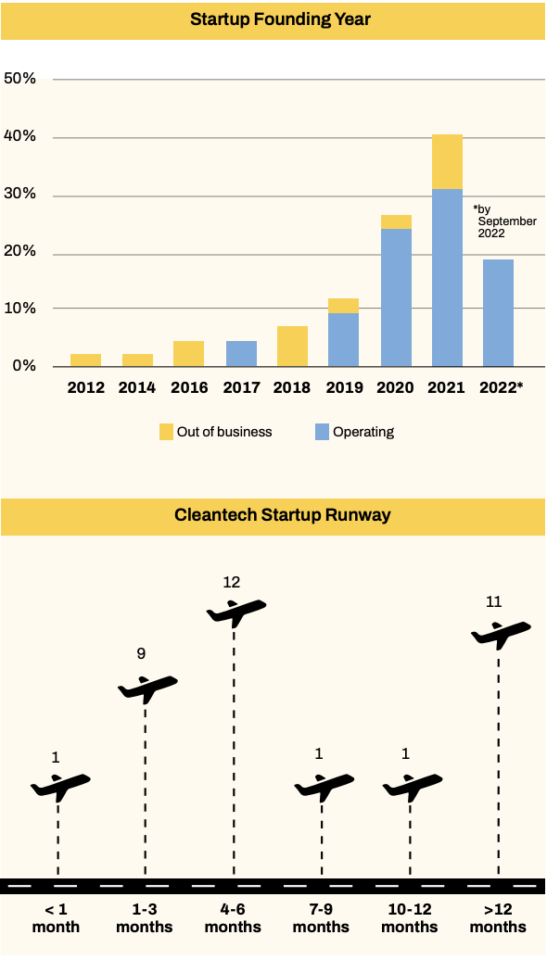Jakarta, 13 September 2023 – The government of Indonesia should play a more active role in growing the country’s nascent cleantech startup ecosystem, which is critical to accelerating the energy transition and unlocking the economic potential of clean energy, according to a report from New Energy Nexus Indonesia: Clean Energy Technology Startups in Indonesia: How the Government Can Help the Ecosystem.
 Government support is crucial given that the majority of cleantech startups in Indonesia are still in the early stage of development, and often struggle to obtain support and funding for their technology and business.
Government support is crucial given that the majority of cleantech startups in Indonesia are still in the early stage of development, and often struggle to obtain support and funding for their technology and business.
“The Indonesian government should learn from other countries, and create an environment for cleantech startups to thrive. This support could be in the form of fiscal, financial, and non-financial support accessible to actors in the cleantech startup ecosystem such as startups, venture capital, incubators, and others,” said Pamela Simamora, the lead author of the report at New Energy Nexus Indonesia.
“The support needed for clean energy startups is different from any other established digital startups for instance, the majority of these startups are hardware-based and require a more intensive R&D for their technology development.”
The report survey showed that 22 out of 35 cleantech startups have a runway of less than six months – whereas startups should ideally have a runway of at least 18 months. The survey results also show that the majority of cleantech startups in Indonesia are still bootstrapping and have not been able to secure external funding.
The report highlights several challenges faced by cleantech startups, ranging from difficulty in accessing funding, limited R&D funds for technology development, difficulty in finding a skilled workforce in the clean energy technology field, as well as the weak regulatory framework in the sector. In addition, the majority of venture capital firms mentioned in the report that the limited number of cleantech startups in their portfolios is not due to a lack of interest in this sector, but rather due to the high risks in the clean energy sector in Indonesia given inadequate policies and regulations. The same is mentioned by business incubators and similar organizations surveyed in this report.
Steps the government can take to support cleantech startup.
“Indonesia can learn from other countries that have already developed cleantech startup ecosystems. For example, the provincial government of British Columbia in Canada provides incentives in the form of tax credits for investors who invest in early-stage companies in the clean energy technology sector.”
“In addition, incubation programs, accelerations, and startup competitions organized by various ministries and government agencies need to be aligned to maximize their impact on the startup ecosystem and eliminate overlapping programs,” said Pamela Simamora, the lead author of the report at New Energy Nexus Indonesia.
“The government, for example, can differentiate each program based on the Technology Readiness Level (TRL) of startups participating in programs like Startup4industry, ETIC KESDM, PLN Elevation, and PPBR BRIN. This aligns with best practices in countries like the United States, Chile, and Morocco.”
Additional recommendations:
- The government could catalyze private investment in cleantech startups by mobilizing state-owned venture capital for investment in the cleantech sector and providing a fund-of-funds scheme where the government becomes an investor in selected venture capital funds for early-stage cleantech startup investments. This mechanism is widely used in countries like China and Singapore, which have successfully developed their startup ecosystems, including cleantech startups.
“The government should focus more on early-stage startups rather than late-stage ones to prevent public funds from crowding out private capital from the market,” said Pamela.
- The government needs to ensure that the policy and regulatory framework in the energy sector facilitates a conducive investment climate for the use and development of clean energy technology in Indonesia.
- Strengthening cooperation between the public and private sectors to increase investment in startups, providing testbed facilities to support research and development of clean technology, mandating green procurement practices for the government, and enhancing STEM education and vocational training to prepare a skilled green workforce in Indonesia.
The growth of this sector has tremendous potential for job creation, economic development, and technological innovation. By supporting cleantech startups, the Indonesian government can achieve its climate goals, promote economic growth, ensure energy resilience, and enhance the country’s competitiveness in the global market
View the report here.